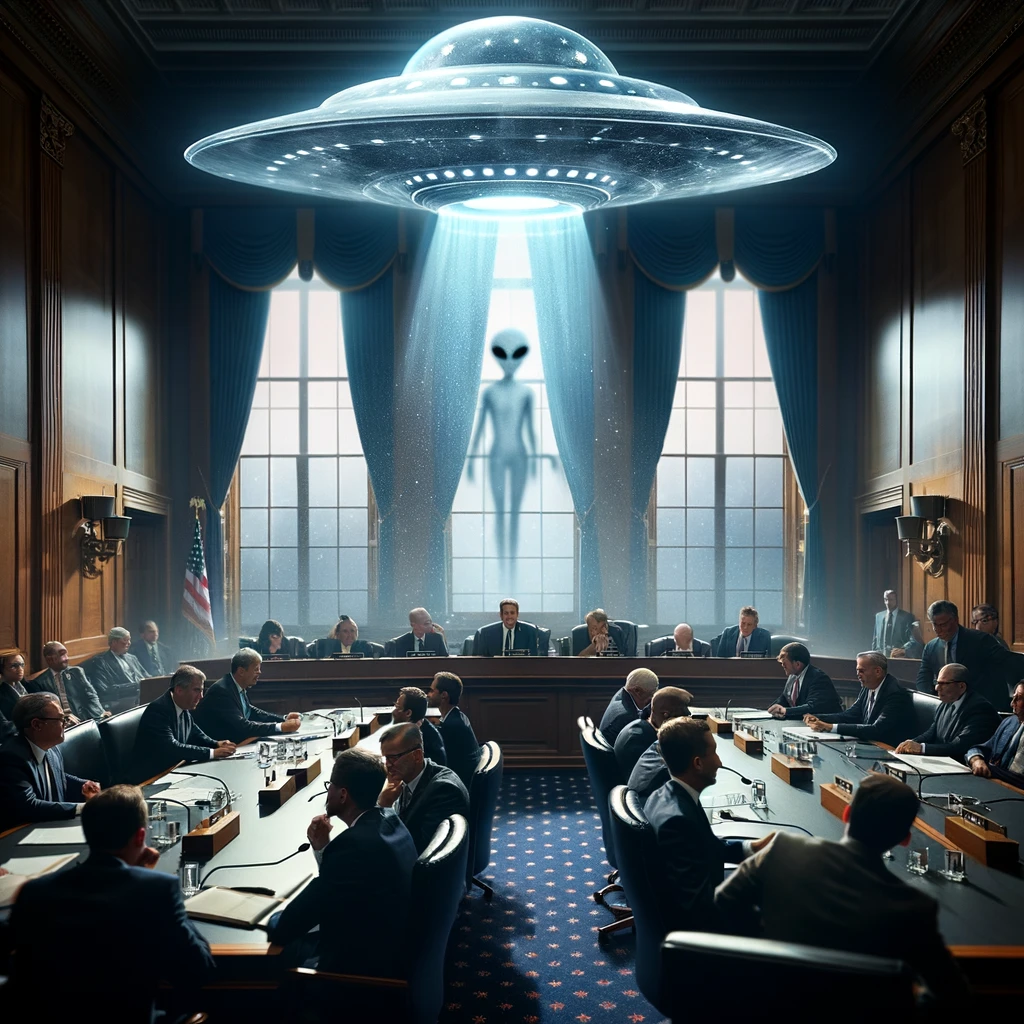UFO Subpoena Power

In a recent episode of “Reality Check” on NewsNation, hosted by Ross Coulhart, a significant discussion unfolded around the push by members of Congress, particularly those in the “UAP Caucus,” for the establishment of a select committee dedicated to investigating Unidentified Anomalous Phenomena (UAP). The urgency for this committee stems from a growing sentiment among these Congressional members that the Pentagon and the intelligence community might not be fully transparent about their knowledge and findings related to UAPs.
This move was catalyzed by a strong letter to Speaker Johnson, advocating for the formation of a UAP select committee under the House Oversight and Accountability Committee, highlighting concerns of deception and misinformation emanating from defense and intelligence sectors.
The Pentagon’s recent denial of any engagement with extraterrestrial life or technology, which has only fueled skepticism and calls for heightened scrutiny and transparency. The proposed committee aims to provide a structured platform for rigorous investigation, leveraging subpoena power to unearth truths and ensure accountability. With bipartisan support, the initiative reflects a collective, earnest pursuit of clarity and understanding regarding UAPs, amidst a backdrop of historical secrecy and alleged obfuscations by government entities.
The Department of Defense (DoD) and the Pentagon have formally denied having any knowledge of extraterrestrial life or technology interacting with Earth. They have also categorically denied the retrieval of non-human technology and any reverse engineering programs related to such technology. Their responses are characterized with language that leaves significant loopholes, which has led to criticism from members of Congress and the public. This stance of denial by the DoD and the Pentagon is a key point of contention, fueling the demand for a select committee to investigate Unidentified Anomalous Phenomena (UAP) more thoroughly, with the hope that such a committee would have the authority to demand transparency and accountability from these defense bodies.
Waived unacknowledged special access programs are a category of highly classified, restricted access programs within the U.S. government and its defense apparatus. The “waived” designation implies an even higher level of security and restriction, where the existence of the program is often not acknowledged or disclosed to individuals beyond a very select group, even within the government or military. These programs are so sensitive that their details, operations, and even their very existence are often exempt from standard reporting requirements to Congress.
The formation of a UAP select committee within Congress, has subpoena power which is the legal authority granted to the committee to compel individuals to testify or produce documents relevant to the committee’s investigation. This power is significant for several reasons:
- Compulsion of Testimony: With subpoena power, the committee can legally require witnesses, including government officials, military personnel, or private citizens, to appear before the committee to provide testimony on UAP-related matters. This is crucial for gathering firsthand accounts and information that may otherwise remain undisclosed.
- Document and Evidence Production: The committee can also demand the release of documents, files, videos, and other evidence related to UAPs from various government agencies, including the Department of Defense and intelligence agencies. Access to such materials could shed light on previously hidden or unacknowledged incidents, research, or findings.
- Enforcement: If an individual or agency refuses to comply with a subpoena, the committee has recourse to legal enforcement mechanisms, which can include holding the non-compliant party in contempt of Congress, leading to potential legal and penal consequences. This enforcement capability adds significant weight to the committee’s investigative efforts.
- Public and Governmental Accountability: The use of subpoena power can help ensure transparency and accountability within the government, particularly in areas shrouded in secrecy like UAPs. It serves as a tool to break through bureaucratic stonewalling and obfuscation, allowing for a more thorough and public examination of sensitive topics.
- Investigative Leverage: Knowing that the committee has subpoena power may incentivize voluntary cooperation from potential witnesses or agencies who might otherwise be reluctant to share information, preferring to avoid the legal compulsion and public scrutiny that can accompany a subpoena.
The effectiveness and impact of subpoena power in the context of a UAP select committee would depend on various factors, including the willingness of congressional leadership to support the committee’s efforts, the readiness of the committee to use this power judiciously, and the broader political and legal challenges that might arise in its application, especially when dealing with highly classified or sensitive UFO and NHI information.
The discussion underscored the pivotal moment this represents in both American and World history, potentially unravelling what could be one of the most profound revelations concerning human interaction with non-human intelligence. The establishment of such a committee could mark a significant stride toward demystifying UAP phenomena, advocating for openness, and confronting the longstanding veil of secrecy that has shrouded this subject.


